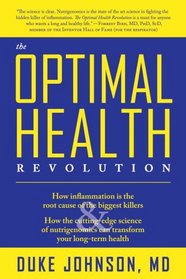Search -
The Optimal Health Revolution: How Inflammation Is the Root Cause of the Biggest Killers and How the Cutting-edge Sceince of Nutrigenomics Can Transform Your Long-term Health
The Optimal Health Revolution How Inflammation Is the Root Cause of the Biggest Killers and How the Cutting-edge Sceince of Nutrigenomics Can Transform Your Long-term Health
Author:
Science is coming to a startling realization. The bulk of our most lethal diseases have a common underlying cause: persistent inflammation. Inflammation is an overactive reaction of our natural immune system function that results in cell and tissue destruction. This persistent inflammation is triggered by our industrial lifestyles, including exp... more »
Author:
Science is coming to a startling realization. The bulk of our most lethal diseases have a common underlying cause: persistent inflammation. Inflammation is an overactive reaction of our natural immune system function that results in cell and tissue destruction. This persistent inflammation is triggered by our industrial lifestyles, including exp... more »
ISBN-13: 9781933771823
ISBN-10: 1933771828
Publication Date: 5/5/2009
Pages: 280
Rating: ?
ISBN-10: 1933771828
Publication Date: 5/5/2009
Pages: 280
Rating: ?
0 stars, based on 0 rating
Genres:
- Health, Fitness & Dieting >> Beauty, Grooming, & Style >> General
- Health, Fitness & Dieting >> Diseases & Physical Ailments >> General
- Health, Fitness & Dieting >> Diseases & Physical Ailments >> Immune Systems
- Health, Fitness & Dieting >> Alternative Medicine >> General
- Health, Fitness & Dieting >> Personal Health >> General
- Health, Fitness & Dieting >> General
- Medicine >> General





